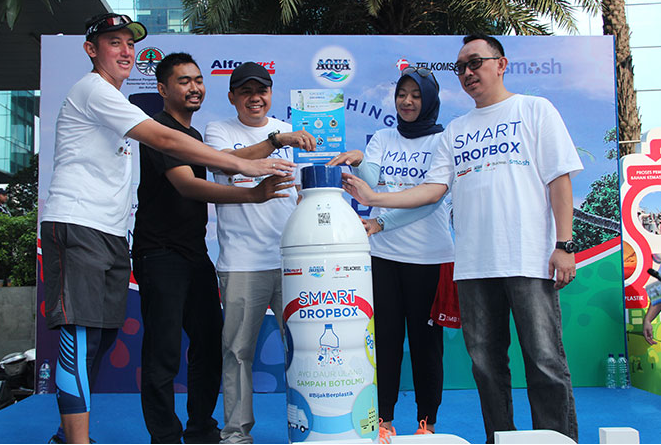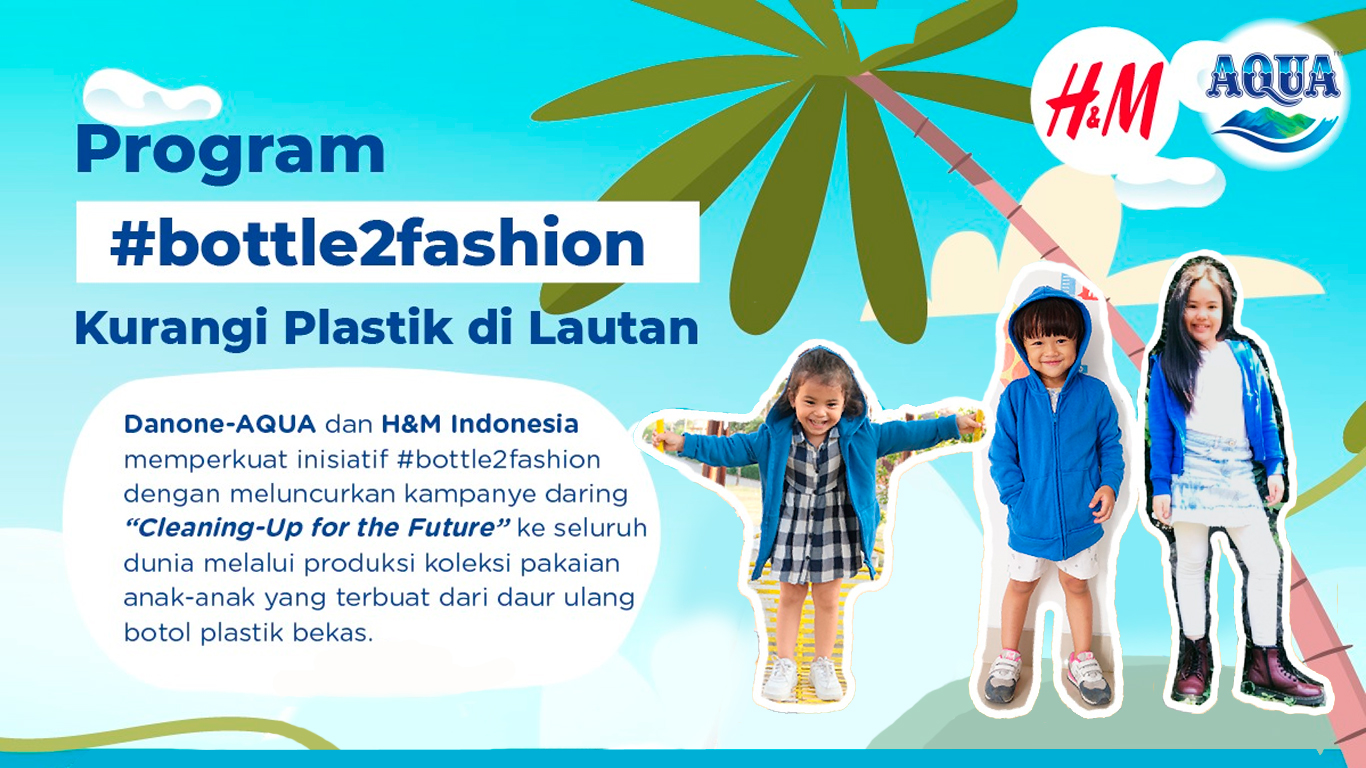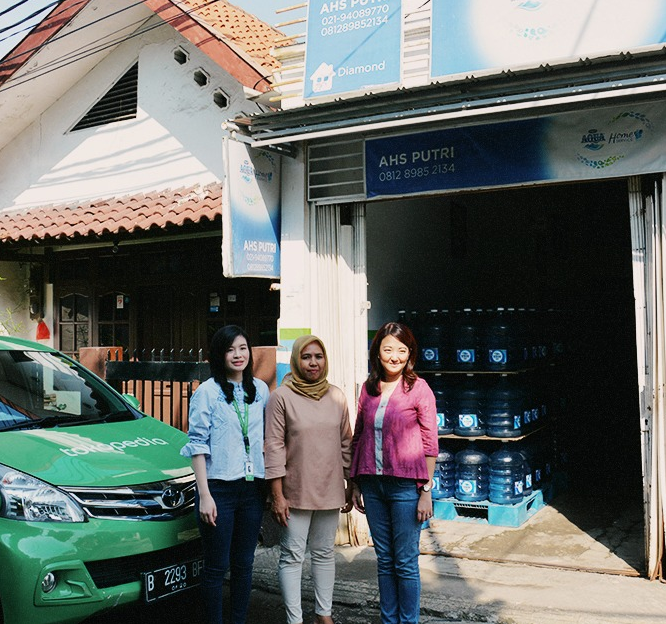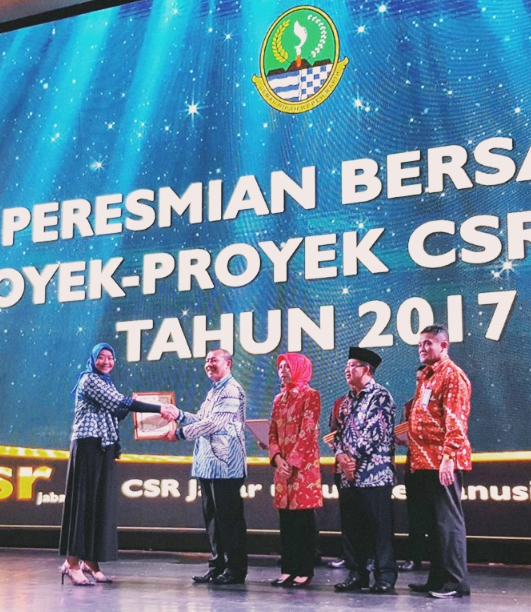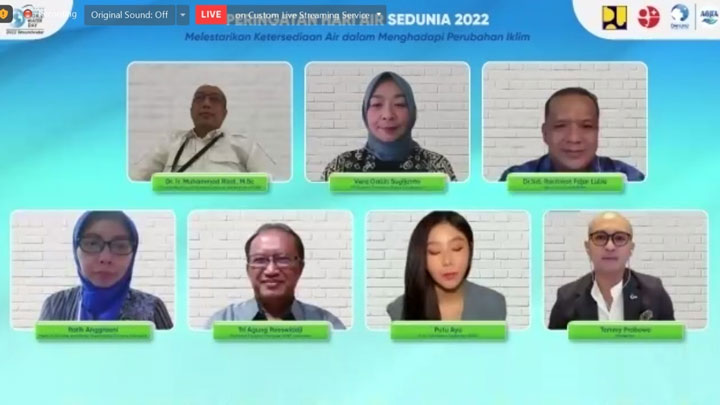Jakarta, May 13, 2018 - Supported by the Ministry of Environment and Forestry (KLHK), Danone-AQUA, Alfamart, Telkomsel and Smash launched Smart Drop Box (SDB) in Car Free Day (CFD) Jakarta, today. SDB is a smart garbage bin with a plastic bottle barcode scanner system connected to mySmash, an application that helps SDB users to register collected bottle junk and earn reward points that can be used as online payments. Previously, SDB users had to download the app on the smart phone and then scan the barcode on the plastic bottle to be discarded. After this plastic bottle is inserted into SDB, it will be rewarded in the form of T-Cash points, where TCash is Telkomsel's e-money product which has been cooperated with various retail and outlets in Indonesia. A total of 80 SDB will be placed in Alfamart outlets in Jakarta and Tangerang areas throughout 2018.
Through the SDB initiative, Danone-AQUA, Alfamart, Telkomsel and Smash collaborated to build an integrated PET plastic bottle waste management model, involving the active role of consumers in the early process of recycling. Smash as an application developer plays a role to design and operate online systems installed in SDB and mySmash applications used by customers. Smash, which stands for Online Waste Management System, is an integrated application platform for waste management throughout Indonesia. The Telkomsel, in addition to escorting mySmash in the birth of the idea of smart technology-based dump trash as part of Business Incubation Program. This Smart Drop Box solution is also supported by Telkomsel's reliable connectivity with a special prime card designed for Internet of Things SIM Card. Alfamart itself acts as a collection point (point collection) plastic waste bottle through the network outlets. In addition, Alfamart will also educate and conduct recycling training from collected bottled waste into value-added products, along with the housewives community around the Alfamart store. The event is planned to be held at Rumah Albi, a community space provided free by Alfamart for community activities around the store such as traditional dance exercises, study together, RT meetings, to seminars and training.
Meanwhile Danone-AQUA will provide rewards for SDB users in the form of T-Cash points and facilitate the transport of plastic bottle from SDB to the nearest waste bank, to be further processed at the Recycling Business Unit (RBU) located in the South Tangerang. The results of this plastic waste management is then brought to the recycling industry to be converted into raw materials of new products, including cloth shopping bags that can replace disposable plastic bags.
In the last decade, plastic has become the most popular material in the world. Its use has increased 20-fold in the last 50 years. Based on the results of Waste Flow Analysis, Value Chain and Recycling in Indonesia conducted by Sustainable Waste Indonesia (SWI) in 2017, it is estimated that 1.3 million tons of plastic waste contaminates the environment every year, including those in the oceans. Predicted by 2050, there will be more plastic waste in the ocean than the fish that live in it. Whereas plastic waste can be the raw material of other products if recycled. The current plastic recycling industry has grown in Indonesia, especially for types of plastics that have economical value such as PET and PP. Their recycling rate is over 60%. The first and most important step in the recycling process is the collection and sorting process that can prevent plastic waste from polluting the environment. This can be done by every individual from the household level.
Dr. Novrizal Tahar, Director of Waste Management, Directorate General of Waste Management, Garbage and Hazardous Toxic Materials (PSLB3) of the Ministry of Environment and Forestry (KLHK) said, "KLHK continues to encourage waste reduction efforts by producers and to provide appreciation for collaboration undertaken by manufacturers with various parties by utilizing technology to simplify the process.The most important part is maintaining the consistency of this collaborative waste reduction effort so as to achieve significant results and guaranteed sustainability. Smart Drop Box development is a best practice that should be replicated by other companies to cooperate across sectors. The success of this program will be a model of waste reduction by producers through packaging withdrawal mechanisms, so that waste issues can be managed from upstream to downstream based on the principle of circular economy, "he said.
Through the SDB initiative, Danone-AQUA, Alfamart, Telkomsel and Smash collaborated to build an integrated PET plastic bottle waste management model, involving the active role of consumers in the early process of recycling. Smash as an application developer plays a role to design and operate online systems installed in SDB and mySmash applications used by customers. Smash, which stands for Online Waste Management System, is an integrated application platform for waste management throughout Indonesia. The Telkomsel, in addition to escorting mySmash in the birth of the idea of smart technology-based dump trash as part of Business Incubation Program. This Smart Drop Box solution is also supported by Telkomsel's reliable connectivity with a special prime card designed for Internet of Things SIM Card. Alfamart itself acts as a collection point (point collection) plastic waste bottle through the network outlets. In addition, Alfamart will also educate and conduct recycling training from collected bottled waste into value-added products, along with the housewives community around the Alfamart store. The event is planned to be held at Rumah Albi, a community space provided free by Alfamart for community activities around the store such as traditional dance exercises, study together, RT meetings, to seminars and training.
Meanwhile Danone-AQUA will provide rewards for SDB users in the form of T-Cash points and facilitate the transport of plastic bottle from SDB to the nearest waste bank, to be further processed at the Recycling Business Unit (RBU) located in the South Tangerang. The results of this plastic waste management is then brought to the recycling industry to be converted into raw materials of new products, including cloth shopping bags that can replace disposable plastic bags.
In the last decade, plastic has become the most popular material in the world. Its use has increased 20-fold in the last 50 years. Based on the results of Waste Flow Analysis, Value Chain and Recycling in Indonesia conducted by Sustainable Waste Indonesia (SWI) in 2017, it is estimated that 1.3 million tons of plastic waste contaminates the environment every year, including those in the oceans. Predicted by 2050, there will be more plastic waste in the ocean than the fish that live in it. Whereas plastic waste can be the raw material of other products if recycled. The current plastic recycling industry has grown in Indonesia, especially for types of plastics that have economical value such as PET and PP. Their recycling rate is over 60%. The first and most important step in the recycling process is the collection and sorting process that can prevent plastic waste from polluting the environment. This can be done by every individual from the household level.
Dr. Novrizal Tahar, Director of Waste Management, Directorate General of Waste Management, Garbage and Hazardous Toxic Materials (PSLB3) of the Ministry of Environment and Forestry (KLHK) said, "KLHK continues to encourage waste reduction efforts by producers and to provide appreciation for collaboration undertaken by manufacturers with various parties by utilizing technology to simplify the process.The most important part is maintaining the consistency of this collaborative waste reduction effort so as to achieve significant results and guaranteed sustainability. Smart Drop Box development is a best practice that should be replicated by other companies to cooperate across sectors. The success of this program will be a model of waste reduction by producers through packaging withdrawal mechanisms, so that waste issues can be managed from upstream to downstream based on the principle of circular economy, "he said.



